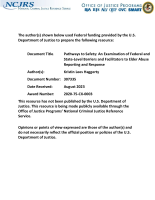Crime
Networks and Pathways of Violent Extremism: Effectiveness of Dis/Misinformation Campaigns
Automation of Sexual Assault DNA Processing Increases Efficiency
Inclusive Research: Engaging People Closest to the Issue Makes for Better Science & Greater Impact; 2023 NIJ Research Conference Plenary
This panel will discuss what inclusive research is, how to conduct it, and what issues and challenges exist about engaging in it. “Inclusive research” has its history as a participatory research method designed to ensure people closest to the issue or problem under study are authentically engaged in the research process rather than simply being “research subjects.” While community-based participatory research has begun to take on greater prominence in the criminal justice realm, such efforts are largely confined to qualitative research inquiries.
See the YouTube Terms of Service and Google Privacy Policy
Mapping the Cyberstalking Landscape: An Empirical Analysis of Federal U.S. Crimes
Cyberstalking: A Growing Challenge for the U.S. Legal System
When State Violence Comes Home: From Criminal Legal System Exposure to Intimate Partner Violence in a Time of Mass Incarceration
VideoTrain plus plus: GAN-based adaptive framework for synthetic video traffic generation
In-person and cyber dating abuse: A longitudinal investigation
Does Observed Conflict Recovery Play a Role in Adolescent Dating Aggression?
2023 NIJ Research Conference Opening Ceremony
The theme of NIJ’s 2023 Research Conference was “evidence to action,” and our goal was to bring researchers and practitioners together to learn about the latest research evidence and how it can be implemented to promote safety, equity, and justice.
The opening ceremony included remarks from U.S. Attorney General Merrick B. Garland, Assistant Attorney General for the Office of Justice Programs Amy Solomon, and NIJ Director Nancy La Vigne.
See the YouTube Terms of Service and Google Privacy Policy



